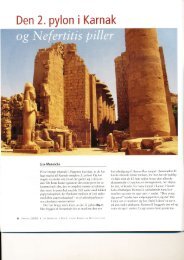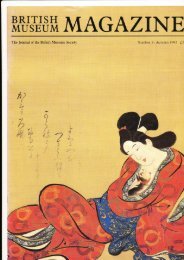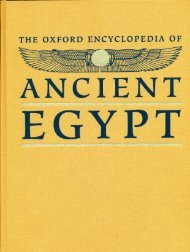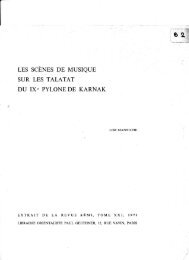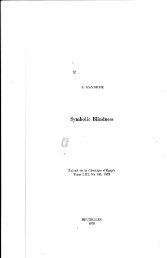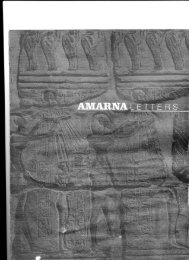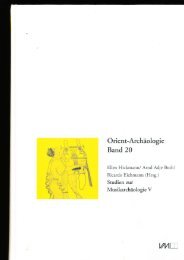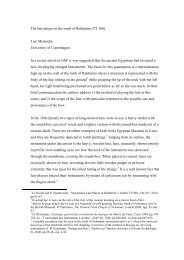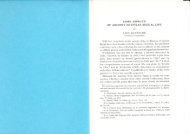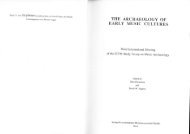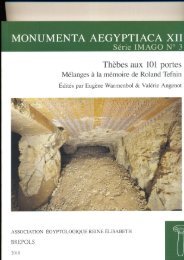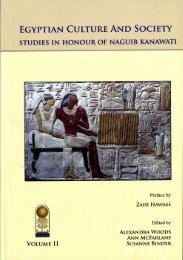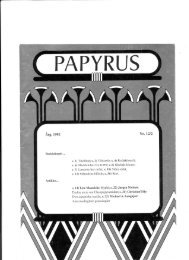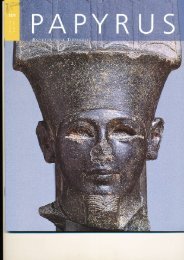Create successful ePaper yourself
Turn your PDF publications into a flip-book with our unique Google optimized e-Paper software.
86<br />
MEMNONIA<br />
action than we are, were unaware of this. In the works of Theophla,stup'<br />
Fliny, Galen, and Dioscorides, we have isolated recipes, very _valuable<br />
in<br />
theii own right, but they do not enlighten us as to the cultural context in<br />
which the freparations were used. -"The Egyptian", "The Mendesian",<br />
Surinu-, Såmpsuchum, Amarakinon - very evocative lames, and so they<br />
would have been among the upper classes of Athens and Rome, imported or<br />
manufactured accordin! to fotbigtt recipes to delight,-but only that - like any<br />
souvenir torn from its -proper context, as wele the foreign scents imported<br />
into Egypt : Djefti and linbl from Alasia, best quality Kadiawar from Khatti,<br />
r"r..t"någ oif from Amor, Gati from Takhsi and ben (moringa)-oil from<br />
Naharin -<br />
as mentioned in one of the students' letters from the late New<br />
Kingdom. We may quote Pliny once more on the demand for foreign scents<br />
in A"rabia, importåd irom abroad : "so tired do mortals get of things !!t{. q'<br />
their own, and so covetous are they of what belongs to other people" (t5)'-In<br />
Athens of the 4'h century BC "Thå Egyptian" was one of.the most popular<br />
p"ifu-"t, consisting of a colourless base oii with the addition of cinnamon<br />
ånO mynir sreeped in wine, ideally matured for eight-years. In Egypt itself,<br />
it would seem that nothing surpåssed the delicate fragrance of the lotus<br />
flower, but its popularity" *ould huue had as much to do with its<br />
Åyttroiogl"al bactgiound as womb of the sun g_od aj the moment of its<br />
cråationånd, in adåition possibly, an awareness of the interesting medicinal<br />
(sexually stimulating) properties of the lotus (26)'<br />
The exploration of the world of ancient scents is just beginning- It<br />
requires ,.u..ui sciences to come together: lexicography,_ iconography,<br />
poil"n analysis, chromatography ånd chemistry, and a thorough<br />
inderstanding of Egyptian "ultute<br />
and its ways of communicating. By<br />
"Åpl"Vi"g ali of theiå, we shall begin to understand "the most superfluous<br />
of all forms of luxurY".<br />
R6sum6<br />
Research into what was by the Roman writer Pliny called "the most<br />
superfluous of all forms of luxury" should focus on four main areas : 1)<br />
lexicographical studies to define more closely the-- ingredients used in<br />
p."puåtiåns mentioned in prescriptions on the walls of Graeco-Roman<br />
t.*pf.r ; 2) iconographical studies of scenes where perfumed unguent is<br />
;pph.J or inerwlJe råpresented by artists lhe<br />
; 3) analyses of samples from<br />
scent conmlnefs ln -rråu-r,<br />
using the most fecent scientific equipment and<br />
methods ; and 4) a study of culturål context in which perfume and unguents<br />
appear in representatioÅ (during temple ritual, as a royal reward to officials,<br />
ur'u used in daily life und' above all, as a significant part of<br />
funerary "o-*ådity equipment and beliefs).



